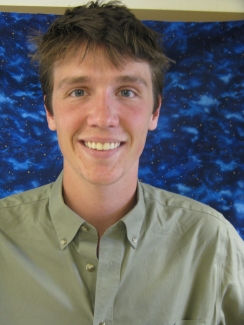Eric Coughlin has won the 2016 R. N. Thomas Award. The $1000 award comes from a fund established by Dr. Nora Andreasian, the widow of JILA co-founder Dick Thomas. Coughlin will also receive a book about Thomas’ storied career in astrophysics.
A talented and productive theorist, Coughlin published eight papers as a graduate student, with two more in the works. His thesis work spanned two distinct areas: fundamental relativistic radiation hydrodynamics and analytical and computational modeling of tidal disruption events (of stars).
About half of Coughlin’s work explored what happens after a tidal disruption event when star is literally torn apart when it moves too close to a supermassive black hole at the center of a galaxy. An observation in 2011 by the Swift Gamma Ray Burst satellite showed that black holes swallow most of the debris, producing X-ray-emitting jets. In his first paper, Coughlin proposed the creation of a star-like object surrounding a funnel through which the jets could flow.
Recently Coughlin partnered with Einstein Fellow Chris Nixon to create simulations of the evolution of the debris stream from a normal star after an encounter with a black hole. The researchers found the streams could be strongly affected by self-gravity, producing meatball-like globs of star stuff. Coughlin is currently working on tidal disruptions of stars by pairs of black holes.
The other part of Coughlin’s work focused on understanding the fundamental physics of how tidal disruption events produce enough energy to accelerate jets.
Coughlin will officially receive his Ph.D. from the University of Colorado Boulder at the summer graduation ceremony on August 18. However, he has already left JILA to begin a NASA-sponsored Einstein Postdoctoral Fellowship at the University of California at Berkeley. To accept this position, Coughlin turned down offers for a Hubble Fellowship at Columbia University, a Prize Fellowship at CalTech, and a Fellowship at the Canadian Institute for Theoretical Astrophysics.



 The Physics Frontiers Centers (PFC) program supports university-based centers and institutes where the collective efforts of a larger group of individuals can enable transformational advances in the most promising research areas. The program is designed to foster major breakthroughs at the intellectual frontiers of physics by providing needed resources such as combinations of talents, skills, disciplines, and/or specialized infrastructure, not usually available to individual investigators or small groups, in an environment in which the collective efforts of the larger group can be shown to be seminal to promoting significant progress in the science and the education of students. PFCs also include creative, substantive activities aimed at enhancing education, broadening participation of traditionally underrepresented groups, and outreach to the scientific community and general public.
The Physics Frontiers Centers (PFC) program supports university-based centers and institutes where the collective efforts of a larger group of individuals can enable transformational advances in the most promising research areas. The program is designed to foster major breakthroughs at the intellectual frontiers of physics by providing needed resources such as combinations of talents, skills, disciplines, and/or specialized infrastructure, not usually available to individual investigators or small groups, in an environment in which the collective efforts of the larger group can be shown to be seminal to promoting significant progress in the science and the education of students. PFCs also include creative, substantive activities aimed at enhancing education, broadening participation of traditionally underrepresented groups, and outreach to the scientific community and general public.